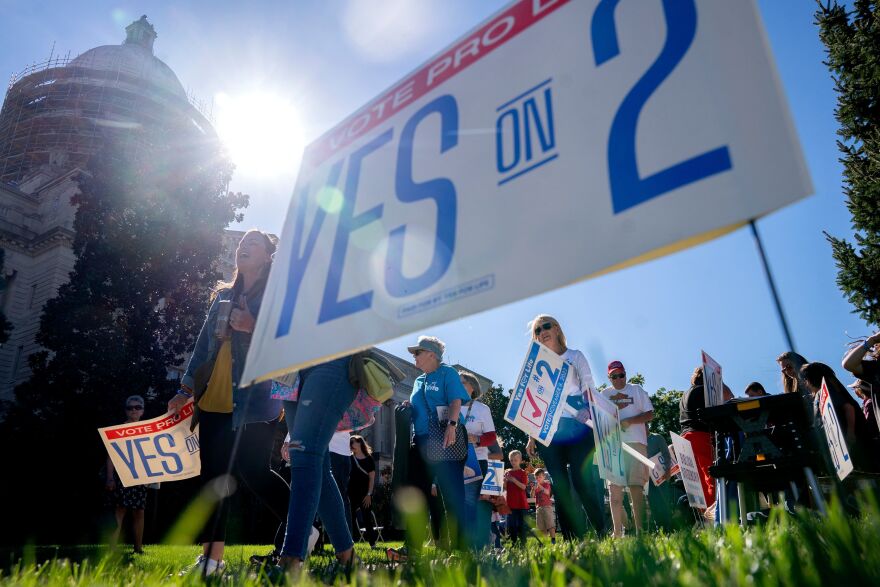Abortion ranks among voters' top issues for the 2022 midterms.
The question for Democrats — who are in a historically unfavorable position as the party in charge of the White House and facing growing concerns about inflation and the rest of the economy — is to what degree the energy unleashed by this summer's U.S. Supreme Court decision overturning Roe v. Wade can be harnessed at the polls, and to what extent that energy can overcome voters' economic worries.
Republicans, meanwhile, are primarily focusing on voters' concerns about the economy, inflation, and crime. In some cases, they're attempting to distance themselves from some of the most severe abortion restrictions that have taken effect since this summer's Dobbs v. Jackson Women's Health Organization decision.
Here's a look at where abortion is, in one form or another, on the ballot.
Ballot measures
Supporters of abortion rights saw a major and largely unforeseen victory in Kansas in August when voters in the red state resoundingly rejected a ballot initiative that would have added language stating that the state constitution contains no protections for abortion rights. But that was just about six weeks after the Dobbs decision was released.
The issue is on the ballot in several more states for this midterm election, including an anti-abortion measure in Montana, and measures in California and Vermont that would explicitly protect abortion rights in those states' constitutions.
Control of state governments

The overturning of Roe sent the question of abortion back to the states – making state legislators and governors extremely important in determining the laws and policies that regulate the procedure.
Governor's races with mixed party control will be key, particularly in Pennsylvania, Michigan, Wisconsin and Kansas – where Democratic governors have fought efforts to impose restrictive abortion laws.
Control of Congress
Advocates on both sides of the abortion debate would like to see national legislation on the issue.
Abortion rights supporters have been pushing for passage of the Women's Health Protection Act, designed to codify Roe's protections in federal law. That legislation passed the House last year in a largely symbolic vote but has lacked the votes to overcome the Senate filibuster.
Anti-abortion groups are supporting legislation proposed by South Carolina Republican Sen. Lindsey Graham to ban the procedure nationwide at 15 weeks.
Marilyn Musgrave, vice president of government affairs at SBA Pro-Life America, said without a nationwide abortion ban, people will continue to travel from states with restrictions to those with more liberal abortion laws.
For example, "California would be an abortion destination – it would be like abortion tourism," Musgrave said.
Musgrave said her group is working to flip the House and Senate into Republican hands.
President Biden has promised he would veto any such anti-abortion legislation that might pass while he's in office, but NARAL Pro-Choice America President Mini Timmaraju said that would be too close for comfort.
"We certainly don't want to let it get that far. That's a bad precedent," Timmaraju said. "We're absolutely not going to let it get to that point; that's our goal."
Abortion v. inflation?
Butler, of Emily's List, said she is hopeful abortion rights will be top of mind for voters in what many political observers are suggesting may be a difficult midterm for Democrats.
"Voters are whole people; they carry their whole selves into the ballot box," Butler said. "And what we have experienced as a nation is that our economy ebbs and flows – but once our fundamental freedoms are taken away, we don't know if we're ever going to be able to get that back."
To that end, a coalition of national abortion rights groups is spending $150 million toward this campaign season, along with hundreds of millions more in abortion-focused ads from Democratic candidates themselves.
Meanwhile, SBA Pro-Life America's Musgrave says the group's Women Speak Out Pac has contacted some 8 million voters nationwide on behalf of anti-abortion rights candidates and related ballot measures.
Copyright 2022 NPR. To see more, visit https://www.npr.org.




